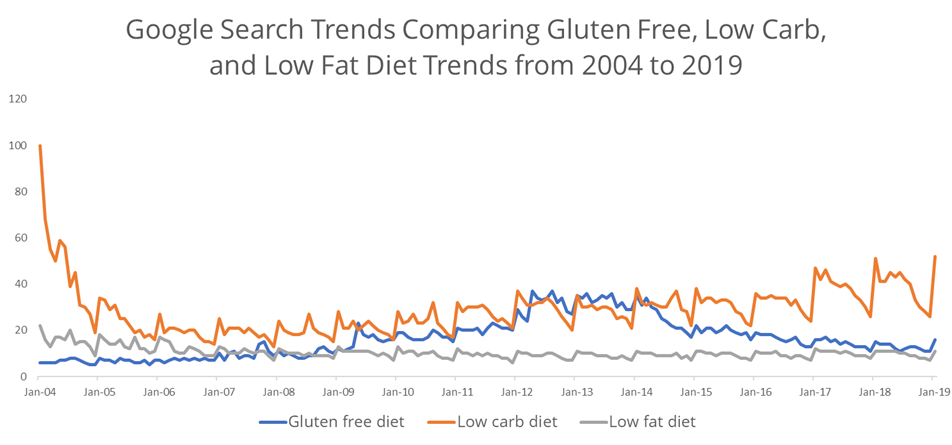- Gluten-free diets surged in popularity, but is it more than a trend? Discover the real reasons behind its rise.
- Seborrheic dermatitis and gluten – is there a connection? Uncover what the science says about this proposed link.
- Placebo or real relief? Learn how dietary changes, even without direct links, can impact your health perceptions.
- Seeking answers for your seborrheic dermatitis? Get clarity on whether gluten is a factor and what steps to take next.
The gluten-free trend exploded in popularity starting around 2004 and has shown remarkable growth. Between 2004 and 2011 alone, the gluten-free market grew at an estimated annual rate of 28%, outstripping both low-carbohydrate and fat-free diet trends [1].
Global search data from 2004 onwards supports this surge. However, it seems the gluten-free trend peaked around mid-2014 and has since experienced a decline in popularity.

Despite this decrease in overall trendiness, a 2015 study involving 30,000 adults across 60 countries revealed that a significant 21% still considered gluten-free marketing a “very important” factor in their food choices [2].
This consumer demand has driven food companies to aggressively market and expand gluten-free product lines. This marketing push may have, in turn, further amplified public interest, potentially blurring the lines between genuine gluten sensitivity and self-diagnosed conditions.
It’s noteworthy that this industry boom occurred with limited initial research into the broad health effects of gluten-free diets on the general population [3].
Considering that humans have relied on wheat as a staple food for millennia [4], it raises questions. Could gluten truly be a widespread health issue affecting nearly 25% of the global population all along?
The range of health problems attributed to gluten is extensive, including common complaints like brain fog, skin rashes, headaches, joint pain, gas, systemic inflammation, depression, psoriasis, and IBS. While some of these issues can be genuinely linked to gluten [5], others are so general that establishing a direct connection becomes challenging.
While true gluten sensitivities exist and necessitate gluten-free options for some, research suggests that gluten might offer health benefits for those without sensitivities [6, 7]. Moreover, switching to gluten-free alternatives could even elevate the intake of toxic metals in our diets [8]. Therefore, completely cutting out gluten should be a carefully thought-out decision, not a rushed conclusion.
Critical Thinking Point
If you suspect gluten is causing your skin problems, medical testing is the most reliable way to confirm or rule out gluten sensitivity and remove much of the uncertainty.

Is Gluten Linked to Seborrheic Dermatitis?
Seborrheic dermatitis is sometimes incorrectly listed as a symptom of gluten intolerance. It’s often claimed that gluten is the direct cause of seborrheic dermatitis, along with associated mood issues like sadness or depression. However, it’s logical to consider that depression and sadness could simply be a consequence of dealing with a visible skin condition that impacts social interactions.
But is there actual scientific evidence to support the idea that gluten causes seborrheic dermatitis?
Currently, the answer is no. There is no scientific data establishing a direct link between gluten sensitivity and seborrheic dermatitis symptoms.
While isolated case studies have reported psoriasis remission following strict gluten-free diets, these are rare and documented primarily in individuals with confirmed antibodies to gliadin (the component of gluten most commonly associated with allergic reactions) [9, 10].
Considering the limited psoriasis data, it’s theoretically possible that a small subset of individuals with underlying gluten sensitivity might experience skin symptoms due to immune system imbalances. However, it’s not scientifically sound to assume this applies to the vast majority of people with seborrheic dermatitis.

Indirect Benefits of Gluten-Free Diets
An often-overlooked aspect of adopting a gluten-free diet is the broader dietary changes that typically accompany it. Going gluten-free often means reducing consumption of common sources of simple carbohydrates and unhealthy fats like pastries, crackers, and pizza.
This shift towards healthier food choices could be the real reason why some individuals report improvements after going gluten-free. These perceived benefits then contribute to the popularity of the gluten-free trend, encouraging more people to try it.
Another factor is that gluten-free diets often reduce the intake of FODMAPs (fermentable oligo-, di-, monosaccharides and polyols). Some researchers suggest that this reduction in FODMAPs, rather than the elimination of gluten itself, might be responsible for the positive effects reported by many [11, 12].
The Power of Placebo
The placebo effect should also be considered. If you believe gluten is causing your problems and adopt a gluten-free diet with conviction, this belief alone can lead to perceived improvements in your condition.

Section Summary
This section explored the gluten-free diet trend and the proposed link between gluten and seborrheic dermatitis.
Key takeaways:
- Gluten-free diets gained significant popularity starting around 2004, creating a large market for related products.
- Gluten became widely discussed and blamed for numerous chronic health issues, often without sufficient scientific backing.
- Eliminating gluten entirely may not be advisable for the general population and could even have drawbacks.
- Despite anecdotal reports online, current medical research does not support a direct link between gluten and seborrheic dermatitis.
- If you suspect gluten sensitivity, seeking professional medical diagnosis is the most valuable step for long-term health management.

No Comments
Be the first to start a conversation